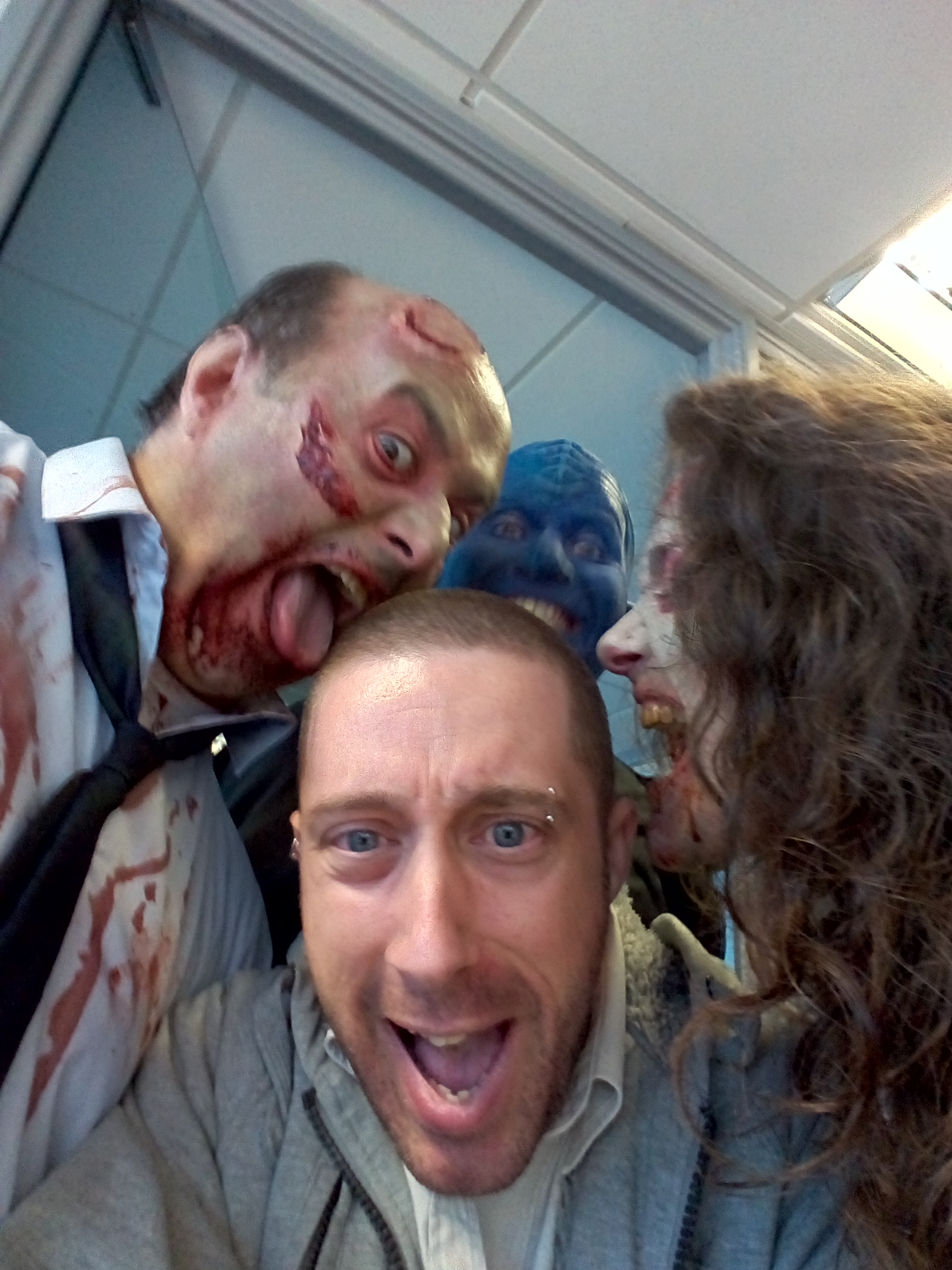ASK & DISCUSS
INDEXIs act structure crushing creativity?
12 years, 3 months ago - Guy Ducker
Worried whether your script should have 3 acts, 5 acts, 22 steps...? Don't. Take a step back and ask what elements a story really needs. Here's what I think:
http://cuttingroomtales.wordpress.com/2013/07/29/breaking-the-mould/
I want to hear what you think now.
Guy Ducker
Only members can post or respond to topics. LOGIN
Not a member of SP? JOIN or FIND OUT MORE
12 years, 3 months ago - Paddy Robinson-Griffin
Guy, I always love reading your blogs, always learn or at least challenge/question something.
The standout point for me in this one was theme. I totally get you. I guess it's in many ways the reward for the audience, to have something to relate to on the bigger level. It was the delicately woven 'theme' in Of Mice and Men that gave it the punch. Lenny's end is the what, the why is apparent from the story, but the story theme behind the 'why' is what makes the story a punch in the guts.
12 years, 3 months ago - Darren Roberts
If you haven't seen it already watch Beasts of the southern wild, I watched it yesterday and I thought it was genuinely amazing and beautiful (not words I'd usually use when describing a film) and that's because it was clearly written from the heart and not by making sure it fits some magical formula and it's this that makes it such a great film, the film is told from the perspective of a young girl and how she views the strange world around her and so it being "unstructured" makes sense if it had been made to fit a structure it would have killed it dead.
12 years, 3 months ago - Marlom Tander
Guy, we might be meaning different things by "Theme" :-)
You say it's the "what the film is about", which is pretty broad brush and by that standard, then yes every film has a theme, but not every theme is important, esp in action driven genres.
But when I hear the word Theme with a Capital T, it implies something narrower, and more precise, such as "the loss of privacy in a digital age", or "dictatorships are bad". Danger of Preaching....That sort of Theme certainly isn't essential.
One other point - IMO if a writer completes his script and discovers it's theme, i.e. the theme is emergent, that's a sign of a good script. But if Theme is important and overt - e.g. a coming of age story - and you have to try and force it, start again as you have major character/plot issues.
12 years, 3 months ago - Peter Spencer
All this stuff about theme and how many beats etc is something that is sold to us because 'outside' of the film industry that purports to be able to sell you the secret to getting 'into' the film industry. With all this 'analysis' it makes you wonder how films got made at all pre-eighties - how on earth did they know what beats to put where? Listen to the 100th episode of Scriptnotes where screenwriters whose films combined have taken well over one billion dollars explain it how it is; you have a beginning middle and end, full stop.
12 years, 3 months ago - Stuart Wright
@Guy Ducker Craig mazin's comments on Scriptnotes about gurus and books is always illuminating and helped me immensely
12 years, 3 months ago - Stuart Wright
Checkout the commentary track on Reservoir Dogs ... Tarantino talks about the accusation that he use flashback in his scripts or non-linear storytelling... he just says the screenplay is the order he chose to tell the story in... structuralists would tell him to put it in the right order... and where wd the fun be in that
12 years, 3 months ago - Dan Selakovich
@Peter:Thanks for that! I wrote my first script in 1978, and thank god I didn't have Syd Field to rely on. That script got me nominated for the very first year of the Sundance institute (you had to be nominated back then). I spent at least 2 hours talking with robert redford's brother in law about it. In the end, it was too commercial for them! HA! When I think about them now, I have to giggle. But he told me if you're this good, this young, you have a great career ahead of you. HA! How the mighty have fallen!! My high points were optioning a couple of scripts. Not quite the career I had planned for myself. The biggest problem in Hollywood is that Development execs HAVE read syd field, taken those story seminars, and since they know the alphabet, think they know how to write. I think it's going to take another generation to get these gurus out of the system.
@Stuart: HA! I never thought of it that way! That's the best description of gurus I've ever heard. Might have to steal that from time to time.
The biggest problem with writing systems is that the characters suck. If you start with solid characters that you know well, the story almost takes care of itself.
12 years, 3 months ago - Marlom Tander
Essential Structure? Beginning, Middle, End, and a pacing that works. Everything else is hot air.
Whether or not the pacing follows a particular Act system or structural rules really doesn't matter, what matters is that it works for the movie.
Much better to focus on your characters and the action that flows from them and their conflicts/aims. And their dialogue. Get that right and the rest follows...
With particular reference to the Blog - I disagree about Theme. A good movie might well have a theme, but it's not essential.
12 years, 3 months ago - Guy Ducker
I quite agree Cath, often you have to write a screenplay in order to work out what it's really about. In fact, I would argue that that is the better way. If you start out by wanting to write a screenplay about, say, the need for understanding between cultures, You can pretty much guarantee that it will read as preachy.
I'd also agree that theme is one of the most difficult and elusive elements of screenwriting.
12 years, 3 months ago - Darren Roberts
If this "fact" about all films having the same structure was discovered by watching and analyzing hundreds of films then that is evidence that we don't need to follow this structure map thing at all because all of these films were made before it existed so either that means it is a structure that occurs naturally as people are writing without them realising it or one that people naturally gravitate towards or this theory is a load of old bollocks.
12 years, 3 months ago - cath le couteur
Interesting this. I never really know theme until I'm at the end of a first draft. And even then I still don't really know. And it changes over and over via refinements. I also think of theme, not really in terms of conveying a point - but more a question I want to explore. A question that might be played out in different ways, a question that intrigues me. I agree that a theme (or themes even) can really lift a piece of work. I think it's also one of the most difficult aspects of writing - at least for me. Probably because it's never clear for me until I've rewritten and rewritten, understand my characters etc. At the same time when it does become (a little) clearer - at the very end - I then find writing quite fun. Finding visual ways to express theme becomes enjoyable and satisfying. But it does feels HORRIBLE.. very painful and confusing early on.
Cath
12 years, 3 months ago - Guy Ducker
I'm interested Marlom, as to why you feel theme not to be essential? For me it's the "what it's about" of a story. Take it away and you're left with a random series of events. As a writer, theme gives you a point to demonstrate; knowing why you're writing the story should theoretically make it easier to know what to write. As an audience, theme tells us why we're watching. What do you think?
12 years, 3 months ago - Guy Ducker
"getting advice to build a building from a demolitions company" Love it!
12 years, 3 months ago - Stuart Wright
These rules about structure are made by deconstructing an existing movie. Craig Mazin on scriptnotes described it as getting advice to build a building from a demolitions company... knowing how something breaks down doesn't mean you know how to build a new one... best advice is from practicing writers - listen to Scriptnotes, BAFTA lecture, Jeff Goldsmith Q & A and Austin Film Festival On Story podcast... hearing how Shane Black works is much more informative than any post-production analysis IMO
12 years, 3 months ago - Arthur Vincie
I think that the "structuralists" and their various theories are onto something, and it does make it easier to get through that first or second script. Most first/second/third screenplays I've read are too messy (in a bad, noncreative way) rather than too structured. Having said that, once you've gotten used to riding the bike it's time to take the training wheels off.
On a purely practical level, as long as the current "development hell machine" is in place in Hollywood (and some version of it has been in place for a long time), the three act/heroes journey/Syd Field/whatever structural "benchmark" will remain a convenient way for overloaded and underpaid readers and assistants to filter out scripts (and be able to defend their choices). Likewise, as long as executives view filmmaking as a mass-produced product (four-quadrant, cross-cultural, blah-blah-blah), it will always be safer for people to bet on the structure rather than the story.
12 years, 3 months ago - Ben Blaine
I definitely agree with everyone about the problems of reverse engineering. Similarly, repeating the mantra about beginnings, middles and ends is not that useful since even badly constructed stories have these.
Likewise, though a great story will have engaging characters and a climax and it will be *about something* these are not properties undetectable in poorly built scripts. More importantly they are not qualities of the story structure; even if the structure is essential in quietly making the audience aware of them.
I think you are closer to the mark when you talk about trajectory, especially when you site the example of "Thirty Short Films About Glenn Gould". After all, one of the best ways of understanding how narrative structure really works is to look at those films that seem to have none. If the rules are, as some claim, inviolable then how do some people get away with breaking them? Well, by telling the audience.
As you point out with "Thirty Short Films..." the clue is in the title. When Wes Anderson breaks "The Royal Tenenbaums" down into 10 acts he does so by calling each one a chapter with a full screen title card. Similarly Tarantino, famous for the games he plays with structure is equally famous for his onscreen captions which give the audience some handle, however tangential, on what is about to occur.
The important thing to draw from this is not that a title card is a cure-all for bad structure but that good structure is the expression of an inherent narrative rhythm. Which is why it's easy to mistake it for the theme.
For instance, it is a mistake to imagine that "Pulp Fiction" is three stories messed together or that it is a story with the end placed in the middle. The beauty of the structure of "Pulp Fiction" is that it distracts from the story (which is fairly dull) and draws your attention instead to Tarantino's message about righteous actions and destiny.
Similarly the 10 chapters of "The Royal Tenenbaums" give the film an even but relentless pace. The steady march through the "book" of the film is the perfect rhythm to express the inevitable tragedy and catharsis of Royal's death.
How do you translate this into your story? Think about expectation, about when you can play with it and when you can't. Think about how the pace of events and revelation in your story might effect the rhythm of your audience's thoughts and breathing. In other words, write like an editor...
12 years, 3 months ago - Guy Ducker
Marlom - I am pretty much using the capital T definition of 'Theme' to which you refer. Certainly themes can be preachy if handled badly, but then characters can be two-dimensional if handled badly, but we wouldn't consider disposing with characters for that reason.
If a story has a theme, and it is woven in to the DNA of the tale, there's a good chance we won't be consciously aware of it, but will come away from the film thinking "that movie really had something". If however there is no intended theme, even if everything else is well-done, we will come away thinking "what was all that about?!"
I say 'intended' theme, because theme can be naturally occurring. If, in your screenplay, all the working-class characters are grounded and noble and all the middle-class characters are foolish and shallow: you're making a statement, even if it's based on your social prejudices rather than a conscious effort to make a point.
I think for me the bottom line is that since the days of the cavemen stories have been told to convey a point, and I don't think that's changed. Sure, we entertain as well, but if your film is to be remembered by generations to come I believe it needs to have something to say.
12 years, 3 months ago - Dan Selakovich
Good morning, Guy. Good for you. I've been calling Syd Field the Devil for 30 years now (and have had to defend that point on these pages). I can't tell you how many times I've read a script that had some really strong writing, and then the story stops as the writer treads water until that magical plot point page. It's so depressing to read those 5-10 pages of filler until the story starts up again. Or watching a character do something totally out of character to get to that "emotional arc" because, hey, that's what you're "supposed" to have on page 70. I think writers, just once, should try writing without those gurus. Without a step outline. Hell, without even knowing your ending. Just start, and see where it takes you. If nothing else, it would be a great exercise. And who knows, maybe it will result in a great story.








